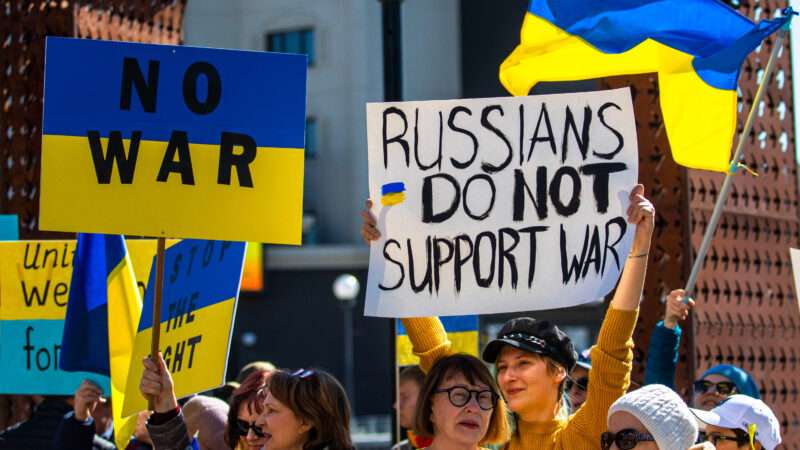
The United States should immediately offer refugee status to Russians looking to avoid military conscription into Russian President Vladimir Putin’s war in Ukraine. With a simple change of immigration policy, the U.S. could undermine the Russian invasion and raise the stakes of the international embargo of the Russian economy. It’s a no-brainer—a policy that wouldn’t require American boots on the ground in Ukraine or any additional risk of nuclear escalation.
Russia’s military efforts are already hampered by a manpower shortage. As Kamil Galeev, a scholar at the nonpartisan Wilson Center, notes, the days when Russia could field seemingly inexhaustible armies are a thing of the past. The average age of a Russian in 1914 was just 16 years old; today, it’s 40 and rapidly rising. The Russian military needs to replace the 1,000 or so soldiers killed in Ukraine each day, but it has faced pervasive draft-dodging from conscripts and is increasingly reliant on foreign auxiliaries from Chechnya and Syria.
Although the Russian army is running low on soldiers, it still boasts a massive reserve of 2 million men, mostly former conscripts. These men are poorly trained and calling them to active-duty service would show desperation; but even demoralized replacements would be an unwelcome addition to the Russian occupation, freeing up better troops for further offensives and prolonging the war.
But if the United States can convince these conscripts to dodge the Russian draft and emigrate to America, it would handicap Russia’s ability to wage war. When it comes to future military capacity, there is little difference between 1,000 soldiers lost to Javelin missiles outside Kyiv and 1,000 draft-dodgers seeking refuge abroad.
There is certainly unmet Russian demand for entry to America. About 250,000 Russians apply for the U.S. diversity visa lottery each year, though only about 2 percent of them win a visa. Including spouses and children, that number swells to more than half a million Russians a year who want to escape Putin’s regime and come to America. These applicants skew young, entrepreneurial, and anti-Putin. The U.S. should grant them the opportunity to avoid fighting against Ukrainians and to instead come to the United States.
There is precedent for such a move—the U.S. once used immigration policy as a Cold War–era tool to undermine the communist revolution in Cuba. Under the Cuban Adjustment Act of 1966, President Lyndon Johnson paroled all refugees who made it to America, granting them green cards after a year. The approximately 1.3 million Cuban-Americans who ultimately immigrated were a constant thorn in the side of the Castro regime.
Consider it the Bering Strait variation on the old “wet foot, dry foot” Cuba policy. Any Russian who arrives on American soil should automatically qualify for refugee status. Welcoming a wave of Russian refugees would both shrink the pool of potential Russian conscripts and worsen the ongoing brain drain of skilled Russian workers from the technology sector, who Putin needs to rebuild his devastated economy, crumbling banking system, and Russia-specific internet sites.
Cuba is the most recent example of the effective use of immigration policy as a non-martial weapon of war. But, the first immigration-related act of the Continental Congress after the Declaration of Independence was an offer of amnesty to the Hessian mercenaries fighting for Great Britain in the Revolutionary War. In August 1776, Congress resolved that “such foreigners…would chuse [sic] to accept of lands, liberty, safety and a communion of good laws, and mild government, in a country where many of their friends and relations are already happily settled, rather than continue exposed to the toils and dangers of a long and bloody war.” Congress not only offered amnesty to Hessian deserters but also proffered land—50 acres for conscripts and up to 1,000 acres for officers.
As many as 6,000 Hessians—or one-fifth of the 30,000 German troops sent by the British—ultimately deserted, many joining the already substantial German-American immigrant communities in Pennsylvania. For sake of comparison, 6,000 men represented an addition of about 0.24 percent to the population of the colonies. To reach a similar ratio today, the U.S. would need to welcome about 800,000 Russians.
Through a smart use of immigration policy, the U.S. could help defeat Putin’s aggression in Ukraine without firing a shot. It would be good for Ukraine, of course, but it would also lower the number of preventable deaths of young Russians forced to fight in an unjust war. Every young Russian working at a mechanic shop in Yonkers or at a grocery store in Philadelphia is one fewer conscript pushing up daisies outside of Kyiv.
The post The U.S. Should Welcome Russians Who Don't Want To Fight Putin's War appeared first on Reason.com.
from Latest https://ift.tt/0ce9aIO
via IFTTT